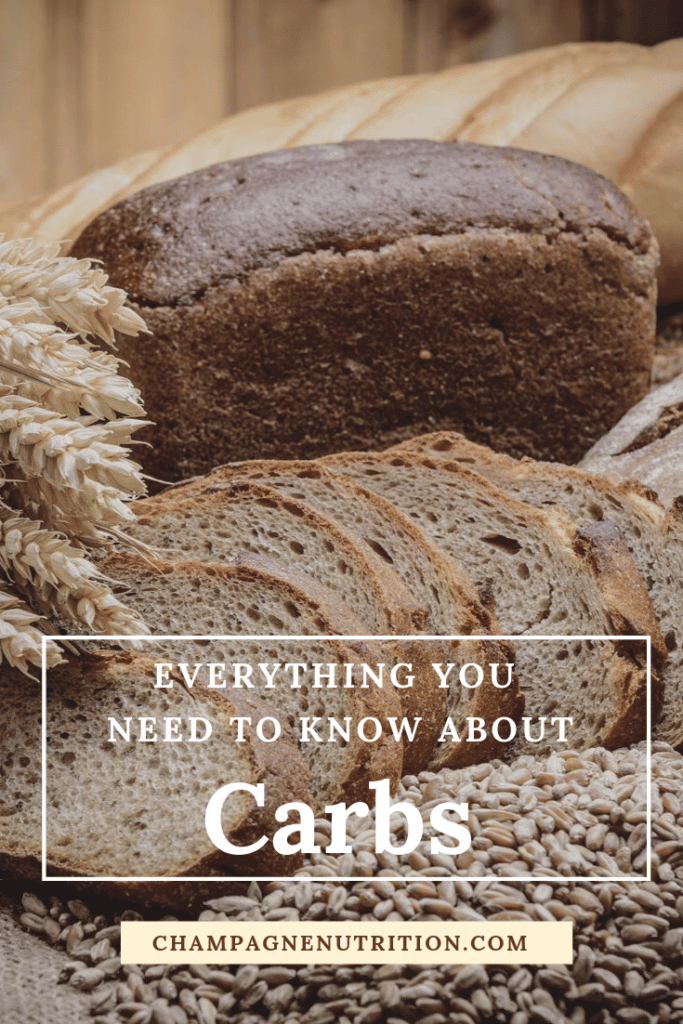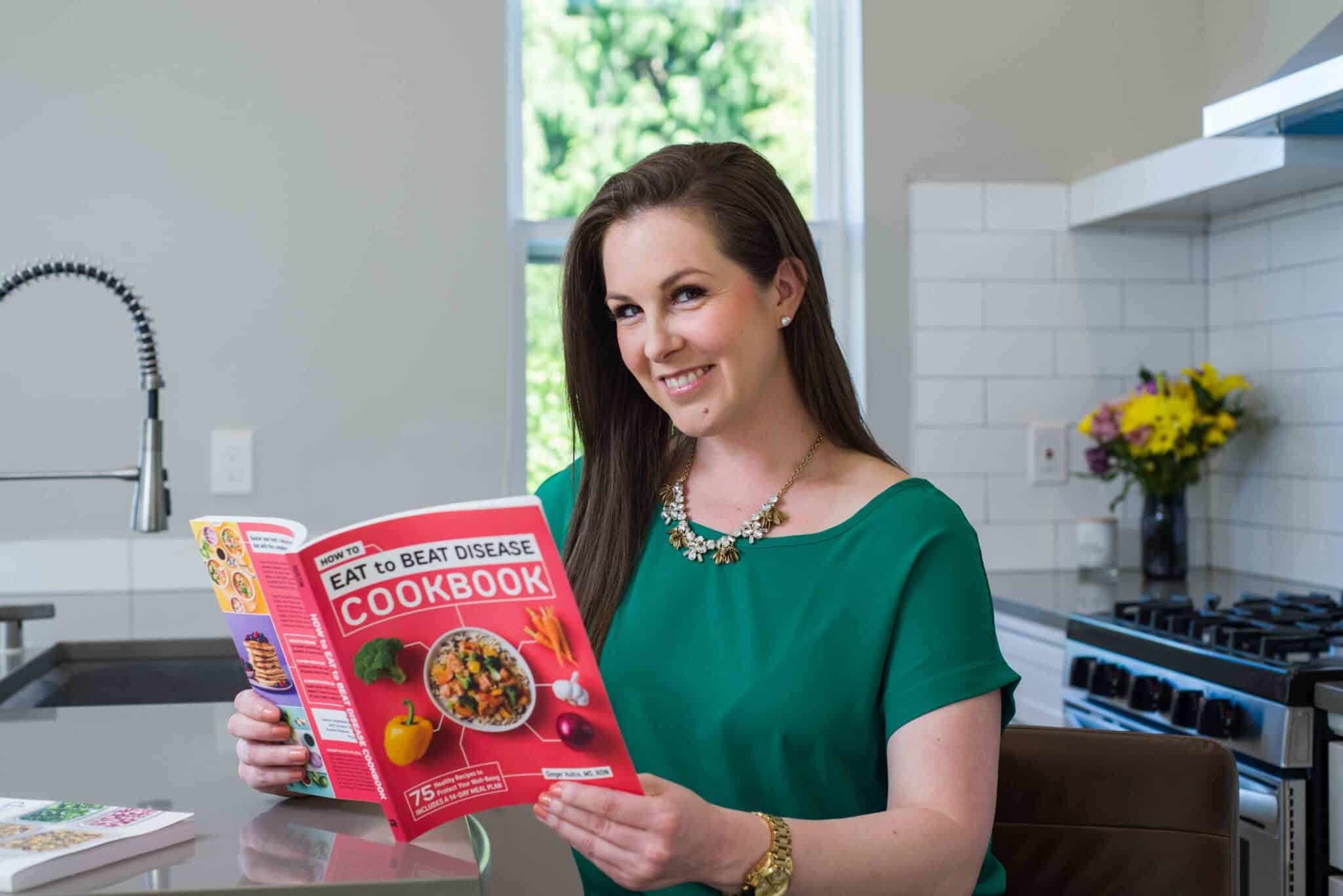Everything you need to know about Carbs
October 14, 2019 by Ginger Hultin MS RDN
I spend a large amount of time on all my nutrition consults talking about carbs. I work with some clients on low carb or ketogenic diets and I work with some clients on vegan and plant-based diets which are often higher carbohydrate plans. Both have some potential benefits as well as considerations and I love my work as a dietitian – everyone gets treated as their own unique, individual! So I wanted to chat with you about everything you need to know about carbs because there’s SO much we need to talk about.
Everything you need to know about Carbs
There are three “macro nutrients”: carbohydrates, fat and protein. The body needs them all to survive. Carbs get such a bad reputation in this era of low carb diets but it’s important to understand that a) they’re just a type of fuel for the body and b) no matter what you do, you’ll be eating them. That being said, its best to be balanced and understand the ins and outs of this complex topic.
When you eat carbohydrates (and that could be eating a piece of bread, a piece of candy, an apple or some beans), it gets broken down in the stomach, the nutrients absorbed in your small intestine, and sent around the body for energy in the form of glucose. Glucose is blood sugar and the body can use it for energy by pulling it directly from the blood or storing it (or drawing it) from the muscles or liver. There’s a reason that the human body keeps about 2000 calories of energy in the body on hand in the form of carbohydrates: the brain needs it to survive! If you don’t have enough carbohydrates for the brain, which sequesters 20% of your calories to work, that’s when it starts using “ketone bodies” for fuel and burning fat stores. Children need carbs. Athletes need carbs. And YOU need carbs, no matter your age or health status.
If you or someone you know has questions about how many carbs are right for for your unique needs, please reach out to me.
What IS a carb?
One of the biggest sources of confusion I hear is exactly WHAT constitutes a carb? People will tell me that they’re ‘low carb’ and then drink a beer. Drink a juice. Drink a mocha. Guidelines state that 45-65% of our intake (that’s 225-325 grams) should come from carbohydrates. Of course there’s many ways to run your diet. Ketogenic diets restrict carb intake to <50 grams for example. Here’s a list of foods that contain carbohydrates (and this is not exhaustive):
Juice, sugar, maple syrup, honey, brown sugar, bread, oats, rice, quinoa, farro, barley, millet, grits, pasta, baked goods, pancakes and waffles, cakes, cookies, pizza, cola and ‘regular’ sodas, kombucha, coconut water, beer and wine, bean and lentils, candy, nuts and seeds, milk and dairy foods, ice cream and gelato, all fruits and vegetables, corn, potatoes, chips, popcorn, granola, crackers – let me know if you think of more.
Gluten
Gluten is different than a carb. Gluten is actually a protein found in wheat. So just because you’re gluten-free, that doesn’t mean you avoid carbs. Just because you eat carbohydrates doesn’t mean that you eat gluten. If you need to be gluten-free, definitely meet with a registered dietitian to make sure you’re doing it correctly. Here’s an article I was in recently about what happens to your body when you go gluten free and then one about getting fiber on a gluten-free diet.
Don’t eat anything ‘white’
This is nonsense. I hear this a lot but it should stop being said. What people mean is that they don’t eat sugar or processed/white bread. However, there are some amazing ‘white’ colored foods like cauliflower, onions, and garlic. Just because you avoid processed bread products, that doesn’t mean you’ll lose weight or be healthier. Instead, we need to look at the bigger picture. There may be room for a flakey croissant in your diet if that’s important to you. “Diet” is never just one food – it’s the whole diet that needs to be addressed.

The Best Kind of Carbs
Recent interviews about carbs if you need more reading:
- Well and Good – meeting your fiber needs on a gluten-free diet
-
Prevention – What you need to know about carb cycling
- Livestrong.com – a complete guide to complex carbs
- Runners World– Manuka honey/carbs for fuel
-
Todays Dietitian Magazine – Clean Eating: what it means for you
- The Healthy – what happens to your body when you go gluten-free
- Everyday Health – A detailed Paleo diet food list
-
Gear Patrol – Pros and Cons of the keto diet

Ginger Hultin,MS, RD, CSO
Thanks for visiting! If you're struggling with a cancer diagnosis, autoimmune condition, gut health problems, or even a medical mystery, nutrition can make a HUGE difference in your day-to-day life. I run a virtual, concierge private practice where I partner with my clients over time to help them improve their health through nutrition. Be sure to visit the blog for easy, plant-based, anti-inflammatory recipes and our "Resources" page for a variety of self-paced programs, books, e-books, and nutrition podcast episodes.
